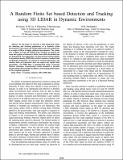A random finite set based detection and tracking using 3D LIDAR in dynamic environments
Author(s)
Kalyan, Bharath; Lee, Kwang Wee; Wijesoma, S.; Moratuwage, M. D. P.
DownloadPatrikalakis_A random finite.pdf (1.500Mb)
PUBLISHER_POLICY
Publisher Policy
Article is made available in accordance with the publisher's policy and may be subject to US copyright law. Please refer to the publisher's site for terms of use.
Terms of use
Metadata
Show full item recordAbstract
In this paper we describe a fully integrated system for detecting and tracking pedestrians in a dynamic urban environment. The system can reliably detect and track pedestrians to a range of 100 m in highly cluttered environments. The system uses a highly accurate 3D LIDAR from Velodyne to segment the scene into regions of interest or blobs, from which the pedestrians are determined. The pedestrians are then tracked using probability hypothesis density (PHD) filter which is based on random finite set theoretic framework. In contrast to classical approaches, this random finite set framework does not require any explicit data associations. The PHD filter is implemented using a Gaussian Mixture technique. Experimental results obtained in dynamic urban settings demonstrate the efficacy and tracking performance of the proposed approach.
Date issued
2010-10Department
Massachusetts Institute of Technology. Department of Mechanical EngineeringJournal
2010 IEEE International Conference on Systems, Man and Cybernetics
Citation
Kalyan, B., K.W. Lee, S. Wijesoma, D. Moratuwage, and N.M. Patrikalakis. A Random Finite Set Based Detection and Tracking Using 3D LIDAR in Dynamic Environments. In 2010 IEEE International Conference on Systems, Man and Cybernetics, 2288-2292. Institute of Electrical and Electronics Engineers, 2010. © Copyright 2010 IEEE
Version: Final published version
ISBN
978-1-4244-6586-6
ISSN
1062-922X